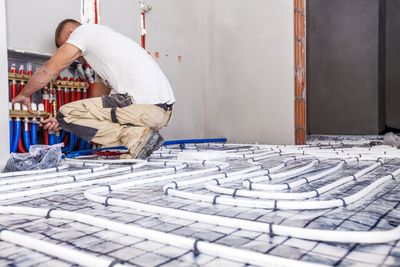Underfloor Heating
If you're considering water underfloor heating, make sure you know how it works and if it's the best fit for your home. A water underfloor heating system can sit beneath pretty much any type of flooring, including stone, tile, wooden or even carpeted surfaces. But unlike electric underfloor heating, water underfloor heating is more complicated to install, and a lot more expensive.
Underfloor heating offers an alternative to radiators in bathrooms, kitchens, or an entire house - or simply a means to warm up a cold floor in winter. But because of the cost and potential upheaval to your home, there are lots of things to think about before you go ahead. To help you make the decision on whether to get water or electric underfloor heating, or, in fact, whether to get underfloor heating at all, we've spoken to hundreds of Which? members who own underfloor heating to find out about their experiences.
We've rounded up their benefits and drawbacks of getting underfloor heating, their thoughts on the costs of running it and top tips on what to consider before going ahead, from both members and experts. To find out more, go to underfloor heating pros and cons. How does water underfloor heating work? With a water-based underfloor heating system, a series of pipes connected to your boiler circulate warm water throughout the floor to heat the space. Alternatively, you can connect the water underfloor pipes to a solar water heating system, air source or ground source heat pump. When we asked underfloor heating owners* where they had their underfloor heating installed in their home: 55% in their bathroom 46% had it in their kitchen 26% in their living room. How much does water underfloor heating cost? The Energy Saving Trust says water underfloor heating is typically more energy efficient than radiators and therefore less expensive to run. This is because the heat emitted from an underfloor system is more evenly distributed than a single radiator, and so the system can use water at a lower temperature. But how much you save on your energy bills over time will depend on how energy efficient your home is, the size of system and room and how you use your heating. A water underfloor heating system is more expensive to fit than an electric one, in part because it's more complicated to install. The price can also be affected by a number of other factors, such as whether the room you want it in is on the top floor or near the heating system. Strong Plumbing and Heating can give you details on how various factors can affect the price, based on speaking to dozens of installers across the UK. We've also asked underfloor heating owners whether they think it has saved them money on their energy bills. See Strong Plumbing and Heating guide to underfloor heating costs and installation to find out more. Installing water underfloor heating
Unlike using ready-to-roll electric underfloor mats - which confident DIYers could lay - a water underfloor system should ideally be installed by a professional. This is because it's a more complex process with plumbing connections and tests that need to be carried out. 81% of underfloor heating owners we asked had it installed by a company, supplier or builder. Just 12% installed it . Underfloor water heating works by connecting pipes laid under the floor to a manifold (essentially a central system to connect pipes together) and then to your heating system. It will also be fitted to a thermostat so that you can regulate the temperature. The floor should be properly prepared and insulated to make the system work efficiently. The floor should be properly prepared and insulated to make the system work efficiently. There needs to be enough space to accommodate this and the piping, so you might have to elevate the floor level, especially if it's being retrofitted in a room that already exists. Because of this, it's easier to install water underfloor heating in a new build as these adjustments can be taken into consideration from the start.
However, there are now a lot of low profile floor systems that mean water underfloor heating can be added to an existing room without raising the floor considerably or disturbing fittings. Find out more about this and the other considerations you'll need to make before getting underfloor heating by visiting Strong Plumbing and Heating underfloor heating pros and cons page. You can find recommended heating engineers or underfloor heating specialists in your area using Which? Trusted Traders. They'll be able to advise you on the best type of underfloor heating for your room size and shape, as well as what will need to be done to the floor. They will also need to test your boiler to check it can support the system. (*In November 2017 we asked 99 Which? members with underfloor heating about their experiences with it in the last five years.)
